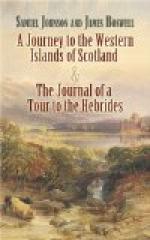The weather was next day too violent for the continuation of our journey; but we had no reason to complain of the interruption. We saw in every place, what we chiefly desired to know, the manners of the people. We had company, and, if we had chosen retirement, we might have had books.
I never was in any house of the Islands, where I did not find books in more languages than one, if I staid long enough to want them, except one from which the family was removed. Literature is not neglected by the higher rank of the Hebridians.
It need not, I suppose, be mentioned, that in countries so little frequented as the Islands, there are no houses where travellers are entertained for money. He that wanders about these wilds, either procures recommendations to those whose habitations lie near his way, or, when night and weariness come upon him, takes the chance of general hospitality. If he finds only a cottage, he can expect little more than shelter; for the cottagers have little more for themselves: but if his good fortune brings him to the residence of a gentleman, he will be glad of a storm to prolong his stay. There is, however, one inn by the sea-side at Sconsor, in Sky, where the post-office is kept.
At the tables where a stranger is received, neither plenty nor delicacy is wanting. A tract of land so thinly inhabited, must have much wild-fowl; and I scarcely remember to have seen a dinner without them. The moorgame is every where to be had. That the sea abounds with fish, needs not be told, for it supplies a great part of Europe. The Isle of Sky has stags and roebucks, but no hares. They sell very numerous droves of oxen yearly to England, and therefore cannot be supposed to want beef at home. Sheep and goats are in great numbers, and they have the common domestick fowls.
But as here is nothing to be bought, every family must kill its own meat, and roast part of it somewhat sooner than Apicius would prescribe. Every kind of flesh is undoubtedly excelled by the variety and emulation of English markets; but that which is not best may be yet very far from bad, and he that shall complain of his fare in the Hebrides, has improved his delicacy more than his manhood.
Their fowls are not like those plumped for sale by the poulterers of London, but they are as good as other places commonly afford, except that the geese, by feeding in the sea, have universally a fishy rankness.
These geese seem to be of a middle race, between the wild and domestick kinds. They are so tame as to own a home, and so wild as sometimes to fly quite away.
Their native bread is made of oats, or barley. Of oatmeal they spread very thin cakes, coarse and hard, to which unaccustomed palates are not easily reconciled. The barley cakes are thicker and softer; I began to eat them without unwillingness; the blackness of their colour raises some dislike, but the taste is not disagreeable. In most houses there is wheat flower, with which we were sure to be treated, if we staid long enough to have it kneaded and baked. As neither yeast nor leaven are used among them, their bread of every kind is unfermented. They make only cakes, and never mould a loaf.




